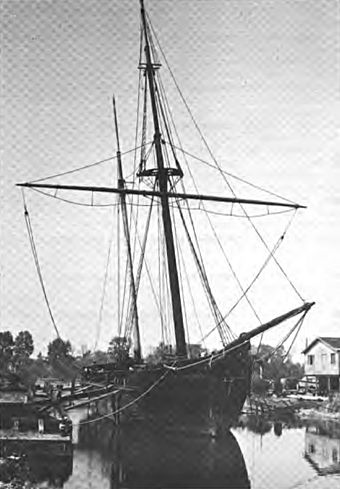Alvin Clark (schooner) facts for kids
|
Alvin Clark (schooner)
|
|
|
Formerly listed on the U.S. National Register of Historic Places
|
|
 |
|
| Location | 6th Ave., Menominee, Michigan |
|---|---|
| Area | 1 acre (0.40 ha) |
| Built | 1846 or 1847 |
| Architectural style | Square stern schooner |
| Demolished | 1994 |
| NRHP reference No. | 74000996 |
Quick facts for kids Significant dates |
|
| Added to NRHP | 1974 |
| Removed from NRHP | June 10, 2020 |
The Alvin Clark was a special kind of sailing ship called a schooner. It sailed on the Great Lakes for nearly 20 years. Built around 1846 or 1847, it sank during a big storm in Green Bay in 1864.
Amazingly, the ship was brought back up from the water in 1969. It was then docked in Menominee, Michigan, at a place called the Mystery Ship Seaport. The Alvin Clark was recognized as an important historic site in 1972. It was also added to the National Register of Historic Places in 1974. Sadly, even though the ship was in great shape when it was raised, it quickly fell apart. This was because there were no plans to keep it preserved. The remains of the Alvin Clark were finally taken apart in 1994.
Contents
What Was the Alvin Clark Like?
The Alvin Clark was a schooner built to carry lumber. It was about 105 feet (32 m) long. That's about the length of three school buses! The ship was 25 feet (8 m) wide. It weighed 218 tons.
The ship was mostly made from strong white oak wood. Its outer planks were 2+1⁄2-inch (63.5 mm) thick. The ribs of the ship were 10-inch (254 mm) wide. It had one main deck and two tall masts. The tallest mast, called the mainmast, was 110 feet (34 m) high. The ship was set up like a brigantine, which means it had a special type of sail on its front mast.
Building and Sailing the Ship
The Alvin Clark was built at the Bates and Davis Shipyard. This was in Trenton, Michigan, in 1846 or 1847. It was probably built by a shipmaker named John Clark. He had a son named Alvin, which is likely where the ship got its name.
John Clark first used the Alvin Clark to transport salt. He sold the ship in 1852. After that, Captain William M. Higgie from Racine, Wisconsin, owned it. The schooner then spent its years carrying lumber to Chicago.
Why Did It Sink?
On June 19, 1864, the ship was sailing through Lake Michigan. It was heading to Oconto, Wisconsin, to pick up more lumber. The ship was empty and sailing fast with all its sails up. As it entered Green Bay, the captain told his crew to clean the storage areas, called holds. So, the covers, or hatches, were taken off.
Suddenly, a storm hit. The ship quickly flipped over near Chambers Island in Green Bay. The captain, the first mate, and another sailor drowned. Two other sailors were saved. People tried to rescue the ship a few months later, but they couldn't. So, the Alvin Clark was left at the bottom of the lake.
Finding the Sunken Ship
In 1967, a sport diver named Frank Hoffman was hired. A fisherman needed help freeing his nets from something stuck underwater in Green Bay. Hoffman dove down and found the nets tangled in what looked like a ship's mast.
Hoffman first called the wreck "the Mystery Ship at 19 Fathoms." But it turned out to be the Alvin Clark! They knew for sure because of a stencil found inside the ship. The ship was completely whole and in excellent condition. Hoffman got the legal rights to salvage the ship the next year.
He put together a team to bring the ship up. They recovered items and cleaned out the mud from the wreck. Work began in the spring of 1968. In July 1969, the team successfully brought the entire ship to the surface.
Bringing It Up From the Deep
At that time, the Alvin Clark was called the "finest preserved historic vessel in the United States." This was said by historian Theodore Karamanski. The ship was fully intact. Some of its old mechanical parts still worked. It also had many well-preserved items inside. Once the water was pumped out, the ship could even float again!
Hoffman docked the ship in Menominee. He cleaned it and put its sails back on. He then moved it into a special dock built into the earth. Hoffman also built a museum nearby. He showed the ship as a tourist attraction at the "Mystery Ship Seaport." The ship was recognized as a Michigan State Historic Site in 1972. It was then added to the National Register of Historic Places in 1974.
What Happened Next?
Once the Alvin Clark was out of the cold, low-oxygen water at the bottom of the bay, it began to fall apart quickly. Hoffman's group did not include museum experts or historic preservation groups. He also wanted to be paid back for the money he spent raising the ship. This made it hard to find a permanent home for the ship or start any preservation work.
The money from the museum was not enough to cover Hoffman's costs. It also didn't provide funds to restore the ship. Over time, the ship got too damaged to be fixed. In 1987, Hoffman sold the ship, which was now just a shell, to a group of local investors. They moved and supported the ship, but they still couldn't save it. The ship was eventually found to be beyond repair and was considered a danger. In 1994, the Mystery Ship Seaport and the remains of the Alvin Clark were taken down. This was to make space for a parking lot.



